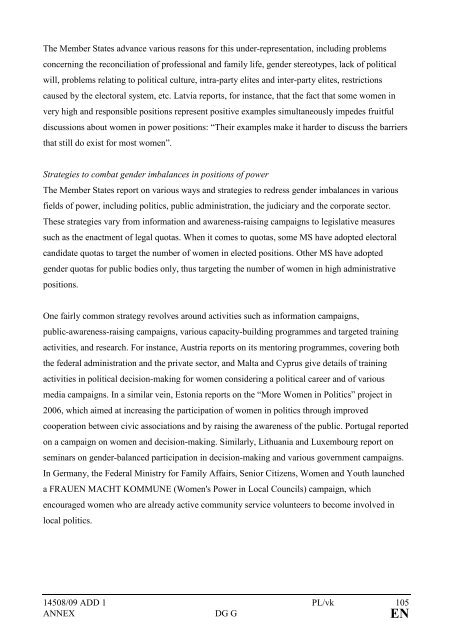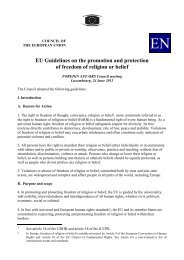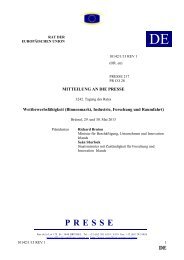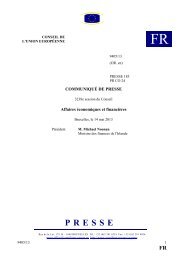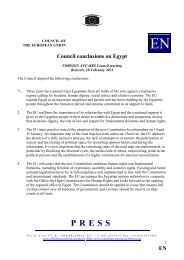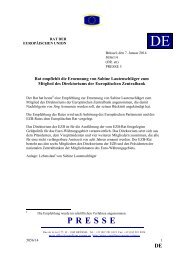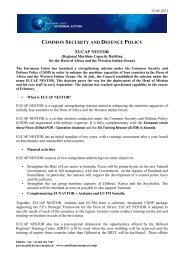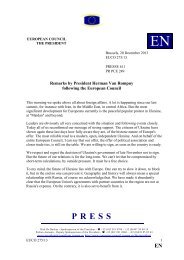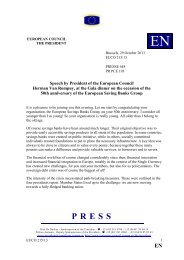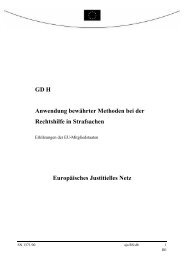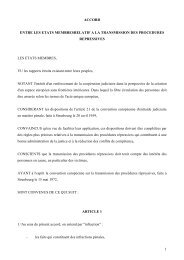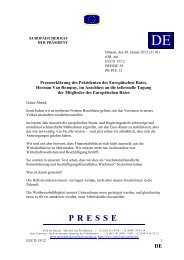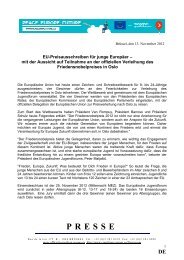14508/09 ADD 1 PL/vk 1 DG G COUNCIL OF THE ... - Europa
14508/09 ADD 1 PL/vk 1 DG G COUNCIL OF THE ... - Europa
14508/09 ADD 1 PL/vk 1 DG G COUNCIL OF THE ... - Europa
You also want an ePaper? Increase the reach of your titles
YUMPU automatically turns print PDFs into web optimized ePapers that Google loves.
The Member States advance various reasons for this under-representation, including problems<br />
concerning the reconciliation of professional and family life, gender stereotypes, lack of political<br />
will, problems relating to political culture, intra-party elites and inter-party elites, restrictions<br />
caused by the electoral system, etc. Latvia reports, for instance, that the fact that some women in<br />
very high and responsible positions represent positive examples simultaneously impedes fruitful<br />
discussions about women in power positions: “Their examples make it harder to discuss the barriers<br />
that still do exist for most women”.<br />
Strategies to combat gender imbalances in positions of power<br />
The Member States report on various ways and strategies to redress gender imbalances in various<br />
fields of power, including politics, public administration, the judiciary and the corporate sector.<br />
These strategies vary from information and awareness-raising campaigns to legislative measures<br />
such as the enactment of legal quotas. When it comes to quotas, some MS have adopted electoral<br />
candidate quotas to target the number of women in elected positions. Other MS have adopted<br />
gender quotas for public bodies only, thus targeting the number of women in high administrative<br />
positions.<br />
One fairly common strategy revolves around activities such as information campaigns,<br />
public-awareness-raising campaigns, various capacity-building programmes and targeted training<br />
activities, and research. For instance, Austria reports on its mentoring programmes, covering both<br />
the federal administration and the private sector, and Malta and Cyprus give details of training<br />
activities in political decision-making for women considering a political career and of various<br />
media campaigns. In a similar vein, Estonia reports on the “More Women in Politics” project in<br />
2006, which aimed at increasing the participation of women in politics through improved<br />
cooperation between civic associations and by raising the awareness of the public. Portugal reported<br />
on a campaign on women and decision-making. Similarly, Lithuania and Luxembourg report on<br />
seminars on gender-balanced participation in decision-making and various government campaigns.<br />
In Germany, the Federal Ministry for Family Affairs, Senior Citizens, Women and Youth launched<br />
a FRAUEN MACHT KOMMUNE (Women's Power in Local Councils) campaign, which<br />
encouraged women who are already active community service volunteers to become involved in<br />
local politics.<br />
<strong>14508</strong>/<strong>09</strong> <strong>ADD</strong> 1 <strong>PL</strong>/<strong>vk</strong> 105<br />
ANNEX <strong>DG</strong> G EN


